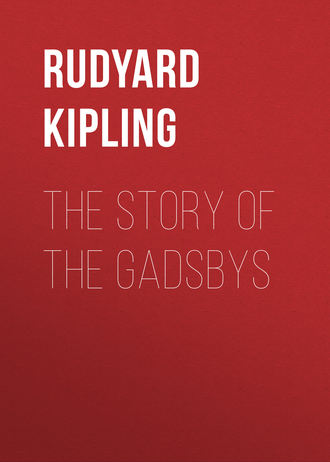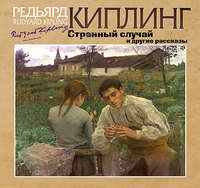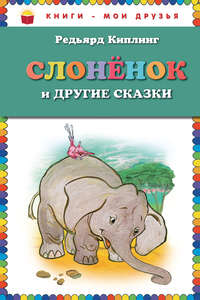 полная версия
полная версияThe Story of the Gadsbys

Rudyard Kipling
The Story of the Gadsbys
Preface
To THE ADDRESS OF CAPTAIN J. MAFFLIN,
Duke of Derry’s (Pink) Hussars.
DEAR MAFFLIN, – You will remember that I wrote this story as an Awful Warning. None the less you have seen fit to disregard it and have followed Gadsby’s example – as I betted you would. I acknowledge that you paid the money at once, but you have prejudiced the mind of Mrs. Mafflin against myself, for though I am almost the only respectable friend of your bachelor days, she has been darwaza band to me throughout the season. Further, she caused you to invite me to dinner at the Club, where you called me “a wild ass of the desert,” and went home at half-past ten, after discoursing for twenty minutes on the responsibilities of housekeeping. You now drive a mail-phaeton and sit under a Church of England clergyman. I am not angry, Jack. It is your kismet, as it was Gaddy’s, and his kismet who can avoid? Do not think that I am moved by a spirit of revenge as I write, thus publicly, that you and you alone are responsible for this book. In other and more expansive days, when you could look at a magnum without flushing and at a cheroot without turning white, you supplied me with most of the material. Take it back again – would that I could have preserved your fatherless speech in the telling – take it back, and by your slippered hearth read it to the late Miss Deercourt. She will not be any the more willing to receive my cards, but she will admire you immensely, and you, I feel sure, will love me. You may even invite me to another very bad dinner – at the Club, which, as you and your wife know, is a safe neutral ground for the entertainment of wild asses. Then, my very dear hypocrite, we shall be quits.
Yours always,
RUDYARD KIPLING.
P. S. – On second thoughts I should recommend you to keep the book away from Mrs. Mafflin.
POOR DEAR MAMMA
The wild hawk to the wind-swept sky, The deer to the wholesome wold, And the heart of a man to the heart of a maid, As it was in the days of old. Gypsy Song.
SCENE. – Interior of Miss MINNIE THREEGAN’S Bedroom at Simla. Miss THREEGAN, in window-seat, turning over a drawerful of things. Miss EMMA DEERCOURT, bosom – friend, who has come to spend the day, sitting on the bed, manipulating the bodice of a ballroom frock, and a bunch of artificial lilies of the valley. Time, 5:30 P. M. on a hot May afternoon.
Miss DEERCOURT. And he said: “I shall never forget this dance,” and, of course, I said: “Oh, how can you be so silly!” Do you think he meant anything, dear?
Miss THREEGAN. (Extracting long lavender silk stocking from the rubbish.) You know him better than I do.
Miss D. Oh, do be sympathetic, Minnie! I’m sure he does. At least I would be sure if he wasn’t always riding with that odious Mrs. Hagan.
Miss T. I suppose so. How does one manage to dance through one’s heels first? Look at this – isn’t it shameful? (Spreads stocking – heel on open hand for inspection.)
Miss D. Never mind that! You can’t mend it. Help me with this hateful bodice. I’ve run the string so, and I’ve run the string so, and I can’t make the fulness come right. Where would you put this? (Waves lilies of the valley.)
Miss T. As high up on the shoulder as possible.
Miss D. Am I quite tall enough? I know it makes May Older look lopsided.
Miss T. Yes, but May hasn’t your shoulders. Hers are like a hock-bottle.
BEARER. (Rapping at door.) Captain Sahib aya.
Miss D. (Jumping up wildly, and hunting for bodice, which she has discarded owing to the heat of the day.) Captain Sahib! What Captain Sahib? Oh, good gracious, and I’m only half dressed! Well, I sha’n’t bother.
Miss T. (Calmly.) You needn’t. It isn’t for us. That’s Captain Gadsby. He is going for a ride with Mamma. He generally comes five days out of the seven.
AGONIZED VOICE. (Prom an inner apartment.) Minnie, run out and give Captain Gadsby some tea, and tell him I shall be ready in ten minutes; and, O Minnie, come to me an instant, there’s a dear girl!
Miss T. Oh, bother! (Aloud.) Very well, Mamma.
Exit, and reappears, after five minutes, flushed, and rubbing her fingers.
Miss D. You look pink. What has happened?
Miss T. (In a stage whisper.) A twenty-four-inch waist, and she won’t let it out. Where are my bangles? (Rummager on the toilet-table, and dabs at her hair with a brush in the interval.)
Miss D. Who is this Captain Gadsby? I don’t think I’ve met him.
Miss T. You must have. He belongs to the Harrar set. I’ve danced with him, but I’ve never talked to him. He’s a big yellow man, just like a newly-hatched chicken, with an enormous moustache. He walks like this (imitates Cavalry swagger), and he goes “Ha – Hmmm!” deep down in his throat when he can’t think of anything to say. Mamma likes him. I don’t.
Miss D. (Abstractedly.) Does he wax that moustache?
Miss T. (Busy with Powder-puff.) Yes, I think so. Why?
Miss D. (Bending over the bodice and sewing furiously.) Oh, nothing – only – Miss T. (Sternly.) Only what? Out with it, Emma.
Miss D. Well, May Olger – she’s engaged to Mr. Charteris, you know – said – Promise you won’t repeat this?
Miss T. Yes, I promise. What did she say?
Miss D. That – that being kissed (with a rush) with a man who didn’t wax his moustache was – like eating an egg without salt.
Miss T. (At her full height, with crushing scorn.) May Olger is a horrid, nasty Thing, and you can tell her I said so. I’m glad she doesn’t belong to my set – I must go and feed this man! Do I look presentable?
Miss D. Yes, perfectly. Be quick and hand him over to your Mother, and then we can talk. I shall listen at the door to hear what you say to him.
Miss T. ‘Sure I don’t care. I’m not afraid of Captain Gadsby.
In proof of this swings into the drawing-room with a mannish stride followed by two short steps, which Produces the effect of a restive horse entering. Misses CAPTAIN GADSBY, who is sitting in the shadow of the window-curtain, and gazes round helplessly.
CAPTAIN GADSBY. (Aside.) The filly, by Jove! ‘Must ha’ picked up that action from the sire. (Aloud, rising.) Good evening, Miss Threegan.
Miss T. (Conscious that she is flushing.) Good evening, Captain Gadsby. Mamma told me to say that she will be ready in a few minutes. Won’t you have some tea? (Aside.) I hope Mamma will be quick. What am I to say to the creature? (Aloud and abruptly.) Milk and sugar?
CAPT. G. No sugar, tha-anks, and very little milk. Ha – Hmmm.
Miss T. (Aside.) If he’s going to do that, I’m lost. I shall laugh. I know I shall!
CAPT. G. (Pulling at his moustache and watching it sideways down his nose.) Ha – Hamm. (Aside.) ‘Wonder what the little beast can talk about. ‘Must make a shot at it.
Miss T. (Aside.) Oh, this is agonizing. I must say something.
Both Together. Have you Been – CAPT. G. I beg your pardon. You were going to say – Miss T. (Who has been watching the moustache with awed fascination.) Won’t you have some eggs?
CAPT. G. (Looking bewilderedly at the tea-table.) Eggs! (Aside.) O Hades! She must have a nursery-tea at this hour. S’pose they’ve wiped her mouth and sent her to me while the Mother is getting on her duds. (Aloud.) No, thanks.
Miss T. (Crimson with confusion.) Oh! I didn’t mean that. I wasn’t thinking of mou – eggs for an instant. I mean salt. Won’t you have some sa – sweets? (Aside.) He’ll think me a raving lunatic. I wish Mamma would come.
CAPT. G. (Aside.) It was a nursery-tea and she’s ashamed of it. By Jove! She doesn’t look half bad when she colors up like that. (Aloud, helping himself from the dish.) Have you seen those new chocolates at Peliti’s?
Miss T. No, I made these myself. What are they like?
CAPT. G. These! De-licious. (Aside.) And that’s a fact.
Miss T. (Aside.) Oh, bother! he’ll think I’m fishing for compliments. (Aloud.) No, Peliti’s of course.
CAPT. G. (Enthusiastically.) Not to compare with these. How d’you make them? I can’t get my khansamah to understand the simplest thing beyond mutton and fowl.
Miss T. Yes? I’m not a khansamah, you know. Perhaps you frighten him. You should never frighten a servant. He loses his head. It’s very bad policy.
CAPT. G. He’s so awf’ly stupid.
Miss T. (Folding her hands in her Zap.) You should call him quietly and say: “O khansamah jee!”
CAPT. G. (Getting interested.) Yes? (Aside.) Fancy that little featherweight saying, “O khansamah jee” to my bloodthirsty Mir Khan!
Miss T Then you should explain the dinner, dish by dish.
CAPT. G. But I can’t speak the vernacular.
Miss T. (Patronizingly.) You should pass the Higher Standard and try.
CAPT. G. I have, but I don’t seem to be any the wiser. Are you?
Miss T. I never passed the Higher Standard. But the khansamah is very patient with me. He doesn’t get angry when I talk about sheep’s topees, or order maunds of grain when I mean seers.
CAPT. G. (Aside with intense indignation.) I’d like to see Mir Khan being rude to that girl! Hullo! Steady the Buffs! (Aloud.) And do you understand about horses, too?
Miss T. A little – not very much. I can’t doctor them, but I know what they ought to eat, and I am in charge of our stable.
CAPT. G. Indeed! You might help me then. What ought a man to give his sais in the Hills? My ruffian says eight rupees, because everything is so dear.
Miss T. Six rupees a month, and one rupee Simla allowance – neither more nor less. And a grass-cut gets six rupees. That’s better than buying grass in the bazar.
CAPT. G. (Admiringly.) How do you know?
Miss T. I have tried both ways.
CAPT. G. Do you ride much, then? I’ve never seen you on the Mall.
Miss T. (Aside.) I haven’t passed him more than fifty times. (Aloud.) Nearly every day.
CAPT. G. By Jove! I didn’t know that. Ha – Hamm (Pulls at his moustache and is silent for forty seconds.) Miss T. (Desperately, and wondering what will happen next.) It looks beautiful. I shouldn’t touch it if I were you. (Aside.) It’s all Mamma’s fault for not coming before. I will be rude!
CAPT. G. (Bronzing under the tan and bringing down his hand very quickly.) Eh! What-at! Oh, yes! Ha! Ha! (Laughs uneasily.) (Aside.) Well, of all the dashed cheek! I never had a woman say that to me yet. She must be a cool hand or else – Ah! that nursery-tea!
VOICE PROM THE UNKNOWN. Tchk! Tchk! Tchk!
CAPT. G. Good gracious! What’s that?
Miss T. The dog, I think. (Aside.) Emma has been listening, and I’ll never forgive her!
CAPT. G. (Aside.) They don’t keep dogs here. (Aloud.) ‘Didn’t sound like a dog, did it?
Miss T. Then it must have been the cat. Let’s go into the veranda. What a lovely evening it is!
Steps into veranda and looks out across the hills into sunset. The CAPTAIN follows.
CAPT. G. (Aside.) Superb eyes! I wonder that I never noticed them before! (Aloud.) There’s going to be a dance at Viceregal Lodge on Wednesday. Can you spare me one?
Miss T. (Shortly.) No! I don’t want any of your charity-dances. You only ask me because Mamma told you to. I hop and I bump. You know I do!
CAPT. G. (Aside.) That’s true, but little girls shouldn’t understand these things. (Aloud.) No, on my word, I don’t. You dance beautifully.
Miss T. Then why do you always stand out after half a dozen turns? I thought officers in the Army didn’t tell fibs.
CAPT. G. It wasn’t a fib, believe me. I really do want the pleasure of a dance with you.
Miss T. (Wickedly.) Why? Won’t Mamma dance with you any more?
CAPT. G. (More earnestly than the necessity demands.) I wasn’t thinking of your Mother. (Aside.) You little vixen!
Miss T. (Still looking out of the window.) Eh? Oh, I beg your par don. I was thinking of something else.
CAPT. G. (Aside.) Well! I wonder what she’ll say next. I’ve never known a woman treat me like this before. I might be – Dash it, I might be an Infantry subaltern! (Aloud.) Oh, please don’t trouble. I’m not worth thinking about. Isn’t your Mother ready yet?
Miss T. I should think so; but promise me, Captain Gadsby, you won’t take poor dear Mamma twice round Jakko any more. It tires her so.
CAPT. G. She says that no exercise tires her.
Miss T. Yes, but she suffers afterward. You don’t know what rheumatism is, and you oughtn’t to keep her out so late, when it gets chill in the evenings.
CAPT. G. (Aside.) Rheumatism. I thought she came off her horse rather in a bunch. Whew! One lives and learns. (Aloud.) I’m sorry to hear that. She hasn’t mentioned it to me.
Miss T. (Flurried.) Of course not! Poor dear Mamma never would. And you mustn’t say that I told you either. Promise me that you won’t. Oh, CAPTAIN Gadsby, promise me you won’t!
CAPT. G. I am dumb, or – I shall be as soon as you’ve given me that dance, and another – if you can trouble yourself to think about me for a minute.
Miss T. But you won’t like it one little bit. You’ll be awfully sorry afterward.
CAPT. G. I shall like it above all things, and I shall only be sorry that I didn’t get more. (Aside.) Now what in the world am I saying?
Miss T. Very well. You will have only yourself to thank if your toes are trodden on. Shall we say Seven?
CAPT. G. And Eleven. (Aside.) She can’t be more than eight stone, but, even then, it’s an absurdly small foot. (Looks at his own riding boots.)
Miss T. They’re beautifully shiny. I can almost see my face in them.
CAPT. G. I was thinking whether I should have to go on crutches for the rest of my life if you trod on my toes.
Miss T. Very likely. Why not change Eleven for a square?
CAPT. G. No, please! I want them both waltzes. Won’t you write them down?
Miss T. J don’t get so many dances that I shall confuse them. You will be the offender.
CAPT. G. Wait and see! (Aside.) She doesn’t dance perfectly, perhaps, but —
Miss T. Your tea must have got cold by this time. Won’t you have another cup?
CAPT. G. No, thanks. Don’t you think it’s pleasanter out in the veranda? (Aside.) I never saw hair take that color in the sunshine before. (Aloud.) It’s like one of Dicksee’s pictures.
Miss T. Yes I It’s a wonderful sunset, isn’t it? (Bluntly.) But what do you know about Dicksee’s pictures?
CAPT. G. I go Home occasionally. And I used to know the Galleries. (Nervously.) You mustn’t think me only a Philistine with – a moustache.
Miss T. Don’t! Please don’t. I’m so sorry for what I said then. I was horribly rude. It slipped out before I thought. Don’t you know the temptation to say frightful and shocking things just for the mere sake of saying them? I’m afraid I gave way to it.
CAPT. G. (Watching the girl as she flushes.) I think I know the feeling. It would be terrible if we all yielded to it, wouldn’t it? For instance, I might say – POOR DEAR MAMMA. (Entering, habited, hatted, and booted.) Ah, Captain Gadsby? ‘Sorry to keep you waiting. ‘Hope you haven’t been bored. ‘My little girl been talking to you?
Miss T. (Aside.) I’m not sorry I spoke about the rheumatism. I’m not! I’m NOT! I only wished I’d mentioned the corns too.
CAPT. G. (Aside.) What a shame! I wonder how old she is. It never occurred to me before. (Aloud.) We’ve been discussing “Shakespeare and the musical glasses” in the veranda.
Miss T. (Aside.) Nice man! He knows that quotation. He isn’t a Philistine with a moustache. (Aloud.) Good-bye, Captain Gadsby. (Aside.) What a huge hand and what a squeeze! I don’t suppose he meant it, but he has driven the rings into my fingers.
POOR DEAR MAMMA. Has Vermillion come round yet? Oh, yes! Captain Gadsby, don’t you think that the saddle is too far forward? (They pass into the front veranda.)
CAPT. G. (Aside.) How the dickens should I know what she prefers? She told me that she doted on horses. (Aloud.) I think it is.
Miss T. (Coming out into front veranda.) Oh! Bad Buldoo! I must speak to him for this. He has taken up the curb two links, and Vermillion bates that. (Passes out and to horse’s head.)
CAPT. G. Let me do it!
Miss. T. No, Vermillion understands me. Don’t you, old man? (Looses curb-chain skilfully, and pats horse on nose and throttle.) Poor Vermillion! Did they want to cut his chin off? There!
Captain Gadsby watches the interlude with undisguised admiration.
POOR DEAR MAMMA. (Tartly to Miss T.) You’ve forgotten your guest, I think, dear.
Miss T. Good gracious! So I have! Good-bye. (Retreats indoors hastily.)
POOR DEAR MAMMA. (Bunching reins in fingers hampered by too tight gauntlets.) CAPTAIN Gadsby!
CAPTAIN GADSBY stoops and makes the foot-rest. POOR DEAR MAMMA blunders, halts too long, and breaks through it.
CAPT. G. (Aside.) Can’t hold up even stone forever. It’s all your rheumatism. (Aloud.) Can’t imagine why I was so clumsy. (Aside.) Now Little Featherweight would have gone up like a bird.
They ride oat of the garden. The Captain falls back.
CAPT. G. (Aside.) How that habit catches her under the arms! Ugh!
POOR DEAR MAMMA. (With the worn smile of sixteen seasons, the worse for exchange.) You’re dull this afternoon, CAPTAIN Gadsby.
CAPT. G. (Spurring up wearily.) Why did you keep me waiting so long?
Et cetera, et cetera, et cetera.
(AN INTERVAL OF THREE WEEKS.)
GILDED YOUTH. (Sitting on railings opposite Town Hall.) Hullo, Gandy! ‘Been trotting out the Gorgonzola! We all thought it was the Gorgan you’re mashing.
CAPT. G. (With withering emphasis.) You young cub! What the – does it matter to you?
Proceeds to read GILDED YOUTH a lecture on discretion and deportment, which crumbles latter like a Chinese Lantern. Departs fuming.
(FURTHER INTERVAL OF FIVE WEEKS.) SCENE. – Exterior of New Simla Library on a foggy evening. Miss THREECAN and Miss DEERCOURT meet among the ‘rickshaws. Miss T. is carrying a bundle of books under her left arm.
Miss D. (Level intonation.) Well?
Miss ‘I’. (Ascending intonation.) Well?
Miss D. (Capturing her friend’s left arm, taking away all the books, placing books in ‘rickshaw, returning to arm, securing hand by third finger and investigating.) Well! You bad girl! And you never told me.
Miss T. (Demurely.) He – he – he only spoke yesterday afternoon.
Miss D. Bless you, dear! And I’m to be bridesmaid, aren’t I? You know you promised ever so long ago.
Miss T. Of course. I’ll tell you all about it to-morrow. (Gets into ‘rickshaw.) O Emma!
Miss D. (With intense interest.) Yes, dear?
Miss T. (Piano.) It’s quite true – about – the – egg.
Miss D. What egg?
Miss T. (Pianissimo prestissimo.) The egg without the salt. (Porte.) Chalo ghar ko jaldi, jhampani! (Go home, jhampani.)
THE WORLD WITHOUT
Certain people of importanceSCENE. – Smoking-room of the Degchi Club. Time, 10.30 P. M. of a stuffy night in the Rains. Four men dispersed in picturesque attitudes and easy-chairs. To these enter BLAYNE of the Irregular Moguls, in evening dress.
BLAYNE. Phew! The Judge ought to be hanged in his own store-godown. Hi, khitmatgarl Poora whiskey-peg, to take the taste out of my mouth.
CURTISS. (Royal Artillery.) That’s it, is it? What the deuce made you dine at the Judge’s? You know his bandobust.
BLAYNE. ‘Thought it couldn’t be worse than the Club, but I’ll swear he buys ullaged liquor and doctors it with gin and ink (looking round the room.) Is this all of you to-night?
DOONE. (P.W.D.) Anthony was called out at dinner. Mingle had a pain in his tummy.
CURTISS. Miggy dies of cholera once a week in the Rains, and gets drunk on chlorodyne in between. ‘Good little chap, though. Any one at the Judge’s, Blayne?
BLAYNE. Cockley and his memsahib looking awfully white and fagged. Female – girl – couldn’t catch the name – on her way to the Hills, under the Cockleys’ charge – the Judge, and Markyn fresh from Simla – disgustingly fit.
CURTISS. Good Lord, how truly magnificent! Was there enough ice? When I mangled garbage there I got one whole lump – nearly as big as a walnut. What had Markyn to say for himself?
BLAYNE. ‘Seems that every one is having a fairly good time up there in spite of the rain. By Jove, that reminds me! I know I hadn’t come across just for the pleasure of your society. News! Great news! Markyn told me.
DOONE. Who’s dead now?
BLAYNE. No one that I know of; but Gandy’s hooked at last!
DROPPING CHORUS. How much? The Devil! Markyn was pulling your leg. Not GANDY!
BLAYNE. (Humming.) “Yea, verily, verily, verily! Verily, verily, I say unto thee.” Theodore, the gift o’ God! Our Phillup! It’s been given out up above.
MACKESY. (Barrister-at-Law.) Huh! Women will give out anything. What does accused say?
BLAYNE. Markyn told me that he congratulated him warily – one hand held out, t’other ready to guard. Gandy turned pink and said it was so.
CURTISS. Poor old Caddy! They all do it. Who’s she? Let’s hear the details.
BLAYNE. She’s a girl – daughter of a Colonel Somebody.
DOONE. Simla’s stiff with Colonels’ daughters. Be more explicit.
BLAYNE. Wait a shake. What was her name? Thresomething. Three —
CURTISS. Stars, perhaps. Caddy knows that brand.
BLAYNE. Threegan – Minnie Threegan.
MACKESY. Threegan Isn’t she a little bit of a girl with red hair?
BLAYNE. ‘Bout that – from what from what Markyn said.
MACKESY. Then I’ve met her. She was at Lucknow last season. ‘Owned a permanently juvenile Mamma, and danced damnably. I say, Jervoise, you knew the Threegans, didn’t you?
JERVOISE. (Civilian of twenty-five years’ service, waking up from his doze.) Eh? What’s that? Knew who? How? I thought I was at Home, confound you!
MACKESY. The Threegan girl’s engaged, so Blayne says.
JERVOISE. (Slowly.) Engaged – en-gaged! Bless my soul! I’m getting an old man! Little Minnie Threegan engaged. It was only the other day I went home with them in the Surat – no, the Massilia – and she was crawling about on her hands and knees among the ayahs. ‘Used to call me the “Tick Tack Sahib” because I showed her my watch. And that was in Sixty – Seven-no, Seventy. Good God, how time flies! I’m an old man. I remember when Threegan married Miss Derwent – daughter of old Hooky Derwent – but that was before your time. And so the little baby’s engaged to have a little baby of her own! Who’s the other fool?
MACKESY. Gadsby of the Pink Hussars.
JERVOISE. ‘Never met him. Threegan lived in debt, married in debt, and ‘ll die in debt. ‘Must be glad to get the girl off his hands.
BLAYNE. Caddy has money – lucky devil. Place at Home, too.
DOONE. He comes of first-class stock. ‘Can’t quite understand his being caught by a Colonel’s daughter, and (looking cautiously round room.) Black Infantry at that! No offence to you, Blayne.
BLAYNE. (Stiffly.) Not much, thaanks.
CURTISS. (Quoting motto of Irregular Moguls.) “We are what we are,” eh, old man? But Gandy was such a superior animal as a rule. Why didn’t he go Home and pick his wife there?
MACKESY. They are all alike when they come to the turn into the straight. About thirty a man begins to get sick of living alone.
CURTISS. And of the eternal muttony-chop in the morning.
DOONE. It’s a dead goat as a rule, but go on, Mackesy.
MACKESY. If a man’s once taken that way nothing will hold him, Do you remember Benoit of your service, Doone? They transferred him to Tharanda when his time came, and he married a platelayer’s daughter, or something of that kind. She was the only female about the place.
DONE. Yes, poor brute. That smashed Benoit’s chances of promotion altogether. Mrs. Benoit used to ask “Was you gem’ to the dance this evenin’?”
CURTISS. Hang it all! Gandy hasn’t married beneath him. There’s no tarbrush in the family, I suppose.
JERVOISE. Tar-brush! Not an anna. You young fellows talk as though the man was doing the girl an honor in marrying her. You’re all too conceited – nothing’s good enough for you.
BLAYNE. Not even an empty Club, a dam’ bad dinner at the Judge’s, and a Station as sickly as a hospital. You’re quite right. We’re a set of Sybarites.
DOONE. Luxurious dogs, wallowing in —
CURTISS. Prickly heat between the shoulders. I’m covered with it. Let’s hope Beora will be cooler.
BLAYNE. Whew! Are you ordered into camp, too? I thought the Gunners had a clean sheet.








